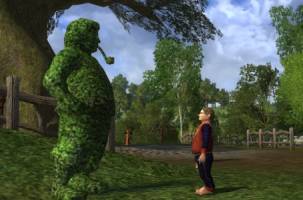Are any of the LOTR races living with immortality? Or do (most of them?) they just have very long lifespans, compared to the race of Man?
Results 1 to 11 of 11
Thread: racial lifespans?
-
Apr 18 2022, 02:32 AM #1
racial lifespans?
-
Apr 18 2022, 05:03 AM #2
Try reading the books the game is based on.....way too many situational variables and I don't want to write a huge reply to explain it all.
And who knows, you may enjoy them. I read the LotR trilogy and the Hobbit every year.
Don't go by what the movies say about anything.
-
Apr 18 2022, 10:08 AM #3
Only Elves have immortality they live for thousands of years, Men/hobbits live as long as we do except those men of line of kings with some Elven blood in them, like Aragorn lives slightly longer, he lived to be 210 years old, Dwarves live long about 200-350 years.
Now this is very brief answer, but you can read a lot more in Tolkien's writings about all this.Pontin Level 140 Hobbit Burglar Leader of Second Breakfast Crickhollow Server.
other classes: Minstrel, Guardian, Captain, Hunter.
Taken many Screenshots of Middle-earth, Also a Moderator of the LotRO Community Discord server
-
Apr 18 2022, 08:15 PM #4
Elves are effectively immortal, yes, and will live as long as the world exists. Even when their body dies their spirit or soul (fëa) lives on in the Halls of Mandos and they can in certain circumstances be reborn in a new body.
See - http://tolkiengateway.net/wiki/F%C3%ABa_and_hr%C3%B6a
-
Apr 18 2022, 10:31 PM #5“If there are no dogs in Heaven, then when I die I want to go where they went.”
- Will Rogers
-
Apr 18 2022, 10:45 PM #6
Since the average lifespan of humans in 1955 was 70, i.e. they reached the age of 70 as often as not, 100 is a heck of a lot longer! (I picked 1955 because that was the year of the first printing of LotR.) Compared to humans of 1700, closer in medical technology and sanitation and so forth to humans of the Third Age of Middle-earth, who had an average lifespan of 43, 100 is well more than double.
We think of people living commonly into their 80s and 90s nowadays but today's average is only 73. Which is still a good bit under 100 but most of us probably imagine "average" being much higher because of our familiarity with any number of older people and our own rejection of our personal mortality; even though it is not. I'm pretty sure that Tolkien meant for his 100-year average lifespan of Hobbits to be remarkably long compared to Men.
-
Apr 19 2022, 12:31 AM #7“If there are no dogs in Heaven, then when I die I want to go where they went.”
- Will Rogers
-
Apr 19 2022, 12:52 AM #8
-
Apr 19 2022, 11:46 AM #9
Interesting info I learned: a lot of times when we hear that the 'average age' was in the 30s or 40s, we imagine feeble, grey-haired elderly 30-year-olds. However the important word is 'average' - people still had normal human lifespans of 70-80, but child and infant mortality was so terrible at the time, it brought the average lifespan way down.
This isn't me arguing with you Tralfazz - just using the statistic you mentioned to tell something interesting that I hadn't realized until recently- and other people in general might not know either, even if you do.

-
Apr 20 2022, 05:01 AM #10
Exactly. If you look back at famous people in the middle-ages, scientists, artists, authors, politicians and such, many of them lived to a ripe old age. It seems it was mostly the poor who died early, either through having dangerous jobs, poor nutrition and lack of even the most basic health care. Obviously the rich also suffered an early demise often due to much more primitive medical knowledge and hygiene standards, but at least they had a fighting chance

Certainly I don't think humans evolution has much to do with the increase in life expectancy over the last few hundred years.“If there are no dogs in Heaven, then when I die I want to go where they went.”
- Will Rogers
-
May 08 2022, 12:07 AM #11
The three of you make excellent points.
It always bugged me when in school I heard our wise teachers tell us that we humans have much longer lifespans than we used to.
They made the implication that some miracle of genetics has helped us to now live longer than we used to.
What is really the case is that a much smaller percentage of us die young. We probably have the same life expectancy that we had perhaps thousands of years ago.
The trick is to not leave early.


 Reply With Quote
Reply With Quote

